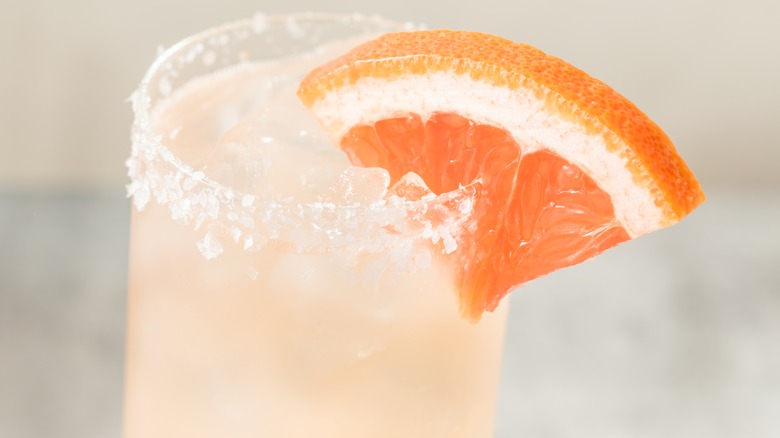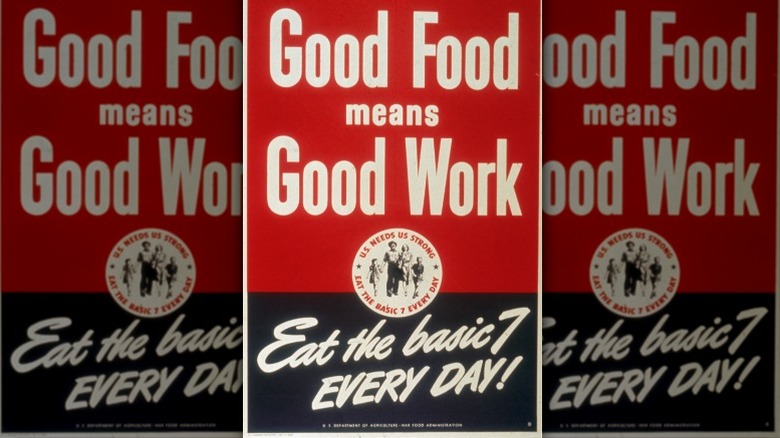Salting Grapefruit Started As The Solution To A Wartime Conundrum
For the modern home cook, the fluorescent-lit aisles of the grocery store may be a place of increasing uneasiness. From supply chain issues to a devastating avian flu outbreak, Market Watch reports that many staple ingredients, like eggs and butter, will be subject to shortages and price hikes. Basically, grocery shopping can feel like a pricey scavenger hunt.
Of course, these seem to be small hassles compared to the rigid days of wartime rationing. The National World War II Museum notes that meat, cheese, and butter—the backbone of the American pantry—were all rationed to the hilt. Still, necessity is the mother of invention. Numerous foods have resulted out of wartime, including the egg-, milk-, and butter-free recipe for Wacky Cake. Though cooks got creative with substitutions, sugar was one ration that proved particularly tricky to handle for those living in America during World War II.
Cakes, coffee, and pastries all suffered during this time, but there was a silent victim in the mix: grapefruit.
The odd yet complementary couple of grapefruit and salt
According to NPR, the international sugar shortage caused by World War I first led the general public to a bitter truth: Grapefruit was hard to stomach without a sprinkle of sugar. Grapefruit was a mega crop for the Florida Citrus Exchange, so in 1919 they launched a campaign with the slogan that grapefruits "need no sugar, and never should have much." Sure, Jan. Luckily, salt advertisers came up with a better idea the second time around.
In 1943, Morton's Salt ran an ad campaign with the following bold statement: "Vitamin-rich Grapefruit — a 'Victory Food Special' — is one of the fruits Uncle Sam advises you to eat. And it tastes even sweeter with Salt!" Complete with a heavy dose of patriotic sensibility, this ad proved supremely popular with World War II shoppers and with the U.S. government, per NPR. But why did this odd pairing become such a hit?
Anyone who's had the savory offshoot of the grapefruit juice-packed greyhound cocktail, the "salty dog," knows that salt and grapefruit are natural complements (via Liquor.com). Why? Salt tames the bitterness of grapefruit. It makes sense for companies like Morton's Salt to advertise this beneficial flavor combo to boost sales, but why would the U.S. government push the narrative?
Problem solving with a salt shaker
This scientifically delicious pairing allowed the government to solve three distinct wartime problems (via NPR). First, it drove more Americans to buy domestic produce, boosting the home economy and limiting their dependence on foreign exports. Second, with a salt shaker on hand to combat grapefruit's bitterness, the public's yearning for scarce sugar eased up.
Third, the government reasoned that a healthy home front equaled a strong home front, so adding fruit for a balanced diet was encouraged. According to Oregon.gov, nutritious fruits and vegetables were not rationed, and they were often promoted with the slogan "U.S. Needs US Strong–Eat the Basic 7 Every Day," the basic seven referring to essential food groups. With the new and improved salted grapefruit, Americans now had a more palatable way to eat this antioxidant-packed citrus.
So if you don't salt your grapefruit for the magic flavor combo, at least do it for your country.


